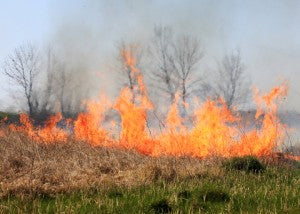At the weekend I went to inspect my beehives, undertaking the task just as I always do by gently blowing smoke into the hives before opening up and checking on the activity inside.
When I’d finished, I opened the smoker and tipped out the remaining fuel – in this case a bit of corrugated cardboard – onto the short grass at my feet, stamping on it to make sure it was no longer alight. I thought I’d done a thorough job, but seconds later the piece of card was well alight again, with flames threatening to spread to the nearby dry grass. Of course I soon put it out properly and prevented the spread of fire, but it made me think of the very real danger involved.
You see, there were no flames on the card; it was just hot, and I couldn’t help but imagine the consequences of what might have happened had I not been there. What if a smoker had thrown a burning cigarette end from the window of a car travelling at more than 60 miles an hour? By the time it had set light to the grass around it they could have been the best part of a mile away, oblivious of the damage they were nevertheless doing to the countryside. Just such an incident was recorded on the M5 at the end of last month.
There’s a lesson for all the smokers amongst us in that, as well as for the picnickers who abandon bottles in the grass, where they can focus the sun’s rays and start fires, and to bored children, released from school for the summer, who might see lighting a small fire as an exciting thing to do.
The lesson is that, just as I experienced with the beekeeping incident, fires can not only start from apparently innocent sources, but can suddenly get much larger, and spread in any direction as dictated by the wind, requiring the help of the Fire Service to put them out.
These small fires are far from harmless in their cumulative effect. The fire service has been taking its safety message to schools as part of “flames aren’t games”, highlighting that starting fires deliberately can result in a fine of up to £5,000 or two years in prison, for those old enough.

And finally, whilst you’re warning children about the dangers of fire, it would be as well to warn them of the hazards of swimming in lakes and rivers; one subject to underwater hazards, the other to currents – both of which are invisible from the surface, and both of which can easily kill.
The summer needs to be a time of enjoying the welcome warmth, not getting into hot water because a moment’s lack of thought put lives and property at risk. As the American police drama Hill Street Blues used to say: “Let’s be careful out there.”

